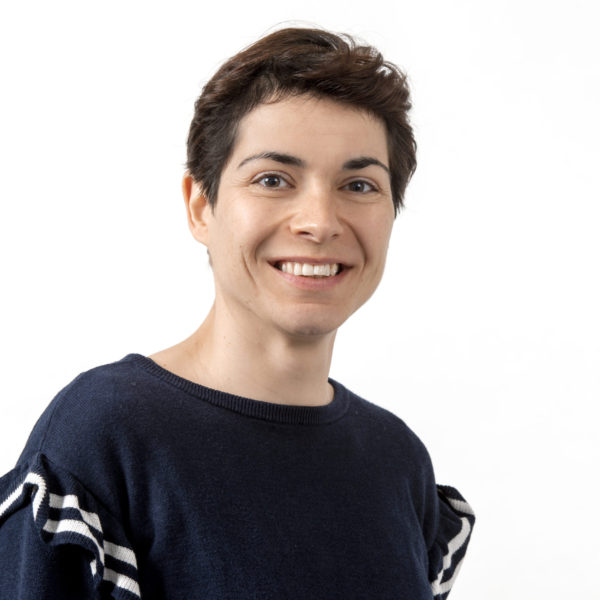“The challenges and obstacles that cancer research presents have always fascinated me the most.”
We recently reported the extension of our research project ‘RSC – RNA Splicing in Cancer’ in collaboration with Merck KGaA, Darmstadt, Germany. For the final phase of this project, Alexandra Duarte, who previously worked as a postdoctoral fellow in the RSC team, will take on the role of group leader. We took the opportunity to have a chat with her.
BioMed X: “Congratulations on your new position as group leader, dear Alexandra. We are very happy that you are staying on board with Team RSC! What are your goals for the upcoming final research year? What’s your focus?”

Dr. Alexandra Duarte: “Thank you! I am really excited about taking on the role of group leader in team RSC and I am very grateful to BioMed X and of course our partner, Merck KGaA, Darmstadt, Germany, for this unique opportunity. The work carried out in the past four years allowed our team to identify aberrant splicing-associated pathways that represent potential vulnerabilities in cancer cells. I am looking forward together with my research fellows in the upcoming year to focusing on the characterization of downstream signaling pathways and co-dependencies in cancer.
BioMed X: “Please tell us something about the beginnings of your research career, what did you study and why?”
AD: “I remember that already in high school I fell in love with the subject of biology. There were so many open questions to me and I recall vividly how I used to drive my teachers crazy with endless questions on different aspects of biology. I was especially attracted to anything that concerned cells and molecules. I was and I am still amazed by how cells and the molecules within drive the processes that regulate a creature’s whole organism. So, there was no doubt for me that for my bachelor I would study Cell and Molecular Biology. I studied at Nova University in Lisbon, Portugal and decided to pursue a career in research so that I could find the right answers to my open questions for myself.”
BioMed X: “You joined the BioMed X Institute in 2018 when the research team RSC (RNA Splicing in Cancer) in collaboration with Merck KGaA, Darmstadt, Germany, was launched. Do you remember why you applied for a position in this team?”
AD: “In my research career to date, there has always been a particular focus: the challenges and obstacles that cancer research presents have always fascinated me the most. RNA splicing, and in particular alternative splicing, has only recently emerged as a critical player in carcinogenesis, despite being a central regulatory mechanism of eukaryotic gene expression and protein function. When I first heard about the BioMed X Institute and its work at the interface between research and academia, I was very excited by the research content and the RSC team’s ambition to explore the poorly understood contribution of splicing dysregulation to cancer biology. Of particular value to me was the close collaboration with our project partner Merck KGaA, Darmstadt, Germany, and our mentors, Dr. Christina Esdar and Prof. Dr. Andreas Kulozik, who have provided us with intensive support over the past four years. Knowing that we can continue our work here and make a valuable contribution to the treatment of cancer patients is more than fulfilling.”
BioMed X: “What was your biggest challenge so far?”
AD: “For me, one of the most difficult aspects of research, especially early in my scientific career, was dealing with my own frustration. It may come as a surprise that I do not mention here content-related or research-related aspects of my work to date, but these were not as challenging as dealing with my own frustration. Over the years, however, I have learned to find a solution here for myself. It helps me to overcome them – and I am certainly not the exception – if I can discuss them with my colleagues or superiors. So, be open-minded and use the power of teamwork.”
BioMed X. “Any advice you would give PhDs at the beginning of their scientific career?”
AD: “There is so much advice that can be given to young researchers when you yourself have successfully completed the initial phase of your scientific career. But the most important one is and remains to stay critical – no matter what it is about. It can be the published literature, the supervisor, but most importantly stay critical with your own research. I think it is very common among researchers that when they are active in a certain field, they develop a corresponding dogmatism, which of course is not helpful. This attitude is actually exactly the opposite of what is required and what we should stand for as researchers: Having an open mind.”
